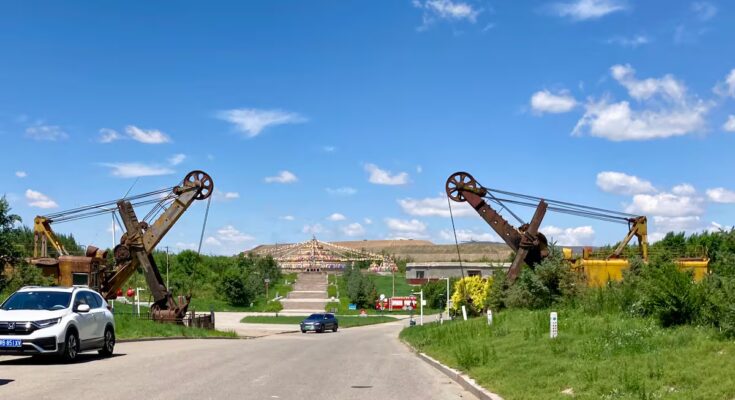Germany’s dependence on essential raw materials from China has long worried the Berlin offices. Faced with current trade tensions, German authorities want to avoid something similar to what happened with the large dependence on Russian gas, which ended up causing a serious energy crisis. To this end, the Executive is about to activate a fund, in which companies will participate, to invest in various projects relating to raw materials.
The struggle that the United States and China have been fighting for months to gain global hegemony also has repercussions on other great powers. This summer, many German companies reported production problems due to critical raw materials from China being supplied late or in insufficient quantities. “The consequences are bottlenecks and additional costs,” reports the Federation of German Industry (BDI).
For example, China wants to increasingly control who accesses the supply chains of rare earths vital for sectors such as the energy transition, green mobility, but also defense and aerospace. The Asian giant controls around 70% of global rare earth extraction and 90% of its global processing capacity, meaning that even if another country mines rare earth minerals, it ends up sending them to China for processing.
The European Union has passed a law on critical raw materials which aims to ensure a secure and sustainable supply of these key materials for European industry and significantly reduce the EU’s dependence on imports supplied by a single country. In this sense, the former German government agreed on a raw materials fund in October 2024. This fund of up to €1 billion provides that the government can participate in raw materials projects, in the extraction, processing and recycling sectors, or support them financially through the Credit Institute for Reconstruction (KfW). The change of government delayed its implementation and now, a year later, it is about to come into operation, a spokesperson for the Ministry of Economy and Energy informed EL PAÍS.
Specifically, companies can count on a participation in KfW’s capital which can vary between 50 and 150 million euros. For approval, an exhaustive risk analysis is carried out to “minimize the risks of non-payment”. “Three projects in Germany, Canada and Australia are currently being examined in depth. The examination is still ongoing, but once concluded with a positive result, the projects can be started,” the spokesperson said. One of these projects is that of the company Vulcan Energy, which plans to obtain climate-neutral lithium from the thermal waters of the Upper Rhine pit.
The fund focuses mainly on advanced projects that require financing above 50 million euros and which have successfully passed the exploratory phase. However, experts ask that projects in their initial phase and smaller ones also be supported.
“Prospecting helps us know what geological resources we have, where they are located and what their quality is,” explains the general director of the Mining, Geological and Environmental Association (VBGU), Ivonne Arenz. “Of course, all this costs time and money. And precisely for this phase there is still no state funding, no support or incentives”, he criticizes on the phone about something he hopes will change. Even if the fund arrives when there are already supply problems, “the important thing is that this step has been taken now. But others will follow!”
Germany is a highly industrialized and technological nation, which means it needs raw materials in large quantities. Digitalisation and the energy transition are changing needs. While the use of coal decreases, that of lithium or rare earths increases. But what makes a raw material critical? On the one hand when there is a lot of demand and few suppliers and on the other when there is a great need. According to the European Commission’s list, these are metals such as lithium, copper, nickel and rare earths (such as neodymium), as well as other minerals such as cobalt, graphite, bauxite, boron and coltan.
“We are completely dependent on China, especially with regard to heavy rare earths, which are now also subject to export controls,” comments Maren Liedtke, geologist at the Federal Institute of Geosciences and Natural Resources (BGR), in a video call, who recommends seeing the problem from “a European perspective, not just a German one”. “We have to behave like Europe, because for a single country it is almost impossible,” he says. “The problem is that we’re not just talking about one specific raw material, but a whole range of raw materials, and that’s what makes it so problematic.”
Addressing this dependence has a very high cost, which is why it is necessary to have long-term purchase contracts at a certain price level. “Companies have to invest, in some cases, several hundred million and they have to be sure that they can sell their products in the long term, at a price that could be higher than in China. I think this is the big obstacle for this type of investment.”
Germany has relevant projects for critical raw materials in an advanced stage of exploration, especially in the Ruhr basin and in Saxony in the east of the country, where, for example, the cross-border Zinnwald deposit, considered one of the largest lithium deposits in the world, is currently at an advanced stage. According to a BGR study, Germany ranked seventh globally in terms of estimated lithium resources in 2023, with approximately 3.8 million tonnes of lithium content.
But ultimately, the mere existence of large deposits is not enough. There has to be social consensus, investors, producers, buyers, skilled labor… “And I think we have a fundamental problem here: how important is this security to me? Am I willing to pay more for it?” adds Liedtke.
The risk that this dependence entails was known. As Cornelius Bähr, an expert on raw materials, energy and industry at the IW economic institute in Cologne, recalls, the first major rare earth crisis occurred already in 2010, when China drastically reduced its exports to Japan for several weeks for foreign policy reasons.
“For Europeans, but also for Germans, for a long time it was advantageous to be able to purchase raw materials and processed products at low prices. In that case, the cost argument played a fundamental role, and the assessment of the risk of perhaps becoming too dependent on a supplier was assessed with less importance”, analyzes Bähr by telephone and recalls that they had already prepared a study at the beginning of 2024 in which they described the risk of dependence on China as “high”, with particular attention to the conflict in Taiwan and its possible consequences.
“Of course, we need to look for alternative producers, but the question is: how many are there? How quickly can these producers expand their production? And are they necessarily less risky countries than China?” he asks.



